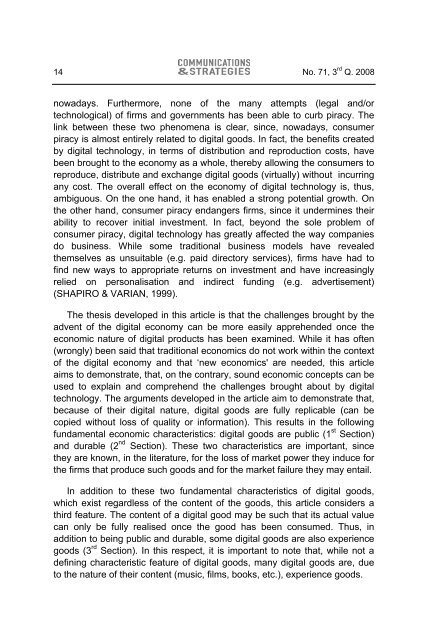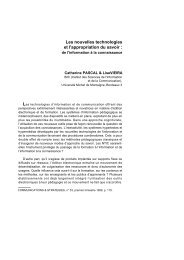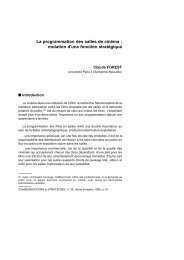The Nature of Digital Goods - Idate
The Nature of Digital Goods - Idate
The Nature of Digital Goods - Idate
You also want an ePaper? Increase the reach of your titles
YUMPU automatically turns print PDFs into web optimized ePapers that Google loves.
14 No. 71, 3 rd Q. 2008<br />
nowadays. Furthermore, none <strong>of</strong> the many attempts (legal and/or<br />
technological) <strong>of</strong> firms and governments has been able to curb piracy. <strong>The</strong><br />
link between these two phenomena is clear, since, nowadays, consumer<br />
piracy is almost entirely related to digital goods. In fact, the benefits created<br />
by digital technology, in terms <strong>of</strong> distribution and reproduction costs, have<br />
been brought to the economy as a whole, thereby allowing the consumers to<br />
reproduce, distribute and exchange digital goods (virtually) without incurring<br />
any cost. <strong>The</strong> overall effect on the economy <strong>of</strong> digital technology is, thus,<br />
ambiguous. On the one hand, it has enabled a strong potential growth. On<br />
the other hand, consumer piracy endangers firms, since it undermines their<br />
ability to recover initial investment. In fact, beyond the sole problem <strong>of</strong><br />
consumer piracy, digital technology has greatly affected the way companies<br />
do business. While some traditional business models have revealed<br />
themselves as unsuitable (e.g. paid directory services), firms have had to<br />
find new ways to appropriate returns on investment and have increasingly<br />
relied on personalisation and indirect funding (e.g. advertisement)<br />
(SHAPIRO & VARIAN, 1999).<br />
<strong>The</strong> thesis developed in this article is that the challenges brought by the<br />
advent <strong>of</strong> the digital economy can be more easily apprehended once the<br />
economic nature <strong>of</strong> digital products has been examined. While it has <strong>of</strong>ten<br />
(wrongly) been said that traditional economics do not work within the context<br />
<strong>of</strong> the digital economy and that ‘new economics' are needed, this article<br />
aims to demonstrate, that, on the contrary, sound economic concepts can be<br />
used to explain and comprehend the challenges brought about by digital<br />
technology. <strong>The</strong> arguments developed in the article aim to demonstrate that,<br />
because <strong>of</strong> their digital nature, digital goods are fully replicable (can be<br />
copied without loss <strong>of</strong> quality or information). This results in the following<br />
fundamental economic characteristics: digital goods are public (1 st Section)<br />
and durable (2 nd Section). <strong>The</strong>se two characteristics are important, since<br />
they are known, in the literature, for the loss <strong>of</strong> market power they induce for<br />
the firms that produce such goods and for the market failure they may entail.<br />
In addition to these two fundamental characteristics <strong>of</strong> digital goods,<br />
which exist regardless <strong>of</strong> the content <strong>of</strong> the goods, this article considers a<br />
third feature. <strong>The</strong> content <strong>of</strong> a digital good may be such that its actual value<br />
can only be fully realised once the good has been consumed. Thus, in<br />
addition to being public and durable, some digital goods are also experience<br />
goods (3 rd Section). In this respect, it is important to note that, while not a<br />
defining characteristic feature <strong>of</strong> digital goods, many digital goods are, due<br />
to the nature <strong>of</strong> their content (music, films, books, etc.), experience goods.





